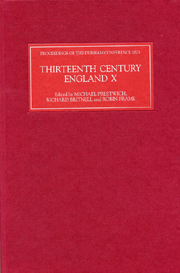Book contents
- Frontmatter
- Contents
- PREFACE
- ABBREVIATIONS
- The Meetings of Kings Henry III and Louis IX
- Counting the Cost: The Financial Implications of the Loss of Normandy
- Networks of Markets and Networks of Patronage in Thirteenth-Century England
- Three Alien Royal Stewards in Thirteenth-Century England: The Careers and Legacy of Mathias Bezill, Imbert Pugeys and Peter de Champvent
- The Eyre de terris datis, 1267–1272
- Joan, Wife of Llywelyn the Great
- Town and Crown: The Kings of England and their City of Dublin
- English Landholding in Ireland
- The Reception of the Matter of Britain in Thirteenth-Century England: A Study of Some Anglo-Norman Manuscripts of Wace's Roman de Brut
- Fearing God, Honouring the King: The Episcopate of Robert de Chaury, Bishop of Carlisle, 1258–1278
- Cloistered Women and Male Authority: Power and Authority in Yorkshire Nunneries in the Later Middle Ages
- Taxation and Settlement in Medieval Devon
- Clipstone Peel: Fortification and Politics from Bannockburn to the Treaty of Leake, 1314–1318
- Royal Patronage and Political Allegiance: The Household Knights of Edward II, 1314–1321
- ‘Edward II’ in Italy: English and Welsh Political Exiles and Fugitives in Continental Europe, 1322–1364
The Eyre de terris datis, 1267–1272
Published online by Cambridge University Press: 12 September 2012
- Frontmatter
- Contents
- PREFACE
- ABBREVIATIONS
- The Meetings of Kings Henry III and Louis IX
- Counting the Cost: The Financial Implications of the Loss of Normandy
- Networks of Markets and Networks of Patronage in Thirteenth-Century England
- Three Alien Royal Stewards in Thirteenth-Century England: The Careers and Legacy of Mathias Bezill, Imbert Pugeys and Peter de Champvent
- The Eyre de terris datis, 1267–1272
- Joan, Wife of Llywelyn the Great
- Town and Crown: The Kings of England and their City of Dublin
- English Landholding in Ireland
- The Reception of the Matter of Britain in Thirteenth-Century England: A Study of Some Anglo-Norman Manuscripts of Wace's Roman de Brut
- Fearing God, Honouring the King: The Episcopate of Robert de Chaury, Bishop of Carlisle, 1258–1278
- Cloistered Women and Male Authority: Power and Authority in Yorkshire Nunneries in the Later Middle Ages
- Taxation and Settlement in Medieval Devon
- Clipstone Peel: Fortification and Politics from Bannockburn to the Treaty of Leake, 1314–1318
- Royal Patronage and Political Allegiance: The Household Knights of Edward II, 1314–1321
- ‘Edward II’ in Italy: English and Welsh Political Exiles and Fugitives in Continental Europe, 1322–1364
Summary
On 28 October 1267, William de Sutwell came before the justices de terris datis at Lewes in Sussex to complain that William de Detling was depriving him of his wardship of a carucate of land in Bodiam, which his father, also William de Detling, had appropriated during the recent civil unrest. William de Detling did not come to answer the complaint and was resummoned to be in court on 31 October, when he again defaulted; the wardship was taken into the king's hand. After further non-appearances, it was adjudged that William de Sutwell should recover the wardship.
William de Sutwell was lord of Bodiam, from whom John de Bodiam held a carucate. John had died at Kenilworth Castle fighting with the rebels who continued resistance after the battle of Evesham, leaving an under-age son to inherit. William de Detling senior, a knight from Folkestone and a loyal supporter of the king, was granted after Evesham, among other modest rewards, the lands and tenements of John de Bodiam. William de Detling died shortly after John de Bodiam, and was succeeded by his son, William, whose inheritance included the wardship of John de Bodiam's heir, which William de Sutwell claimed as lord of the fee.
When William de Detling heard of the judgment, he hastened before the justices by then in session at Chichester to claim his right to redemption payment for the wardship under the terms of the Dictum of Kenilworth. The case was adjourned by request of the parties to Bermondsey on 27 January 1268 but William de Detling again defaulted and the case was heard coram rege at Westminster on 22 April 1268, where William de Detling regained seisin in anticipation of receiving ransom. Before redemption was agreed, claims for damages on both sides had to be assessed by inquest.
- Type
- Chapter
- Information
- Thirteenth Century England XProceedings of the Durham Conference, 2003, pp. 69 - 80Publisher: Boydell & BrewerPrint publication year: 2005



